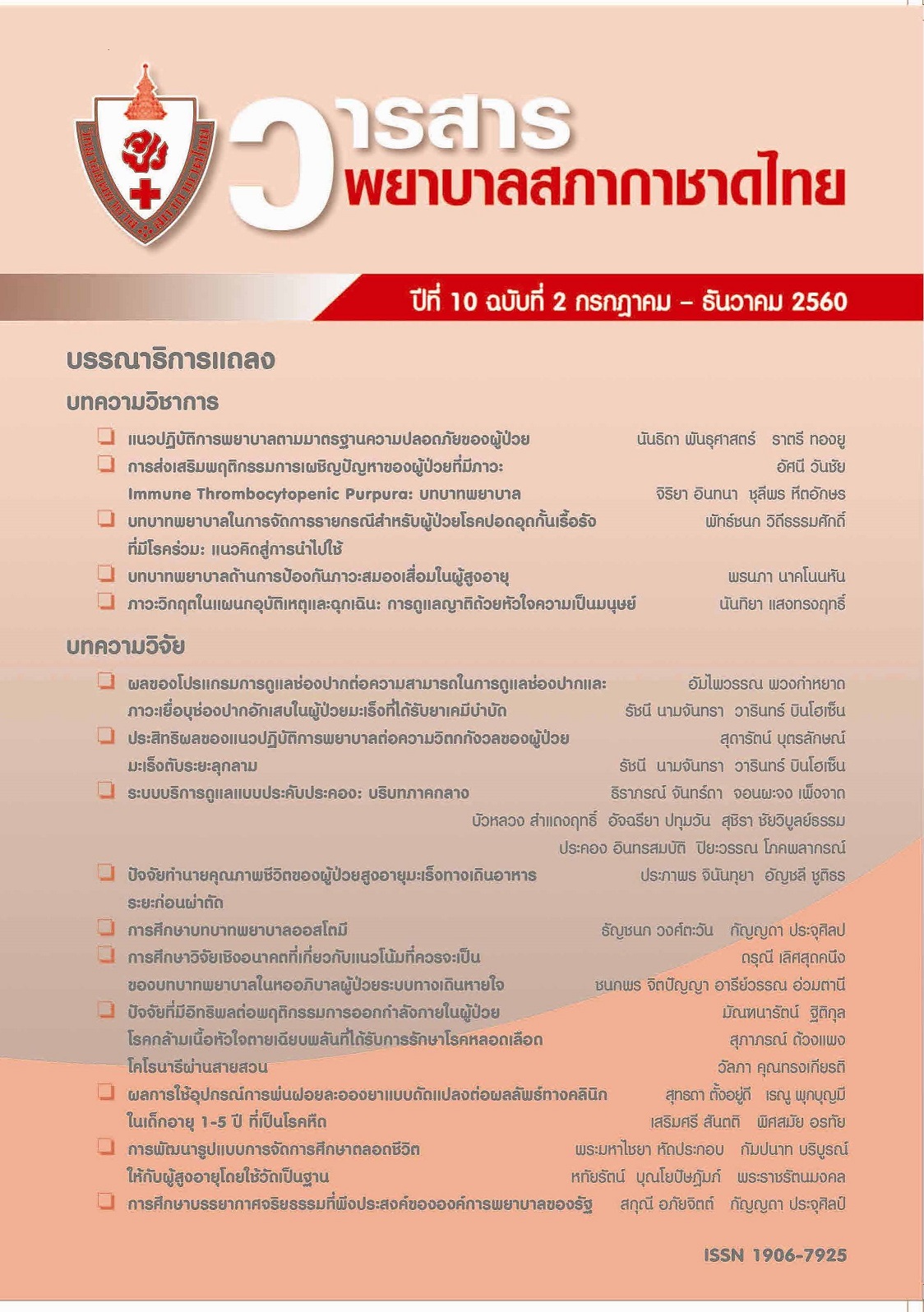Factors Predicting Preoperative Quality of Life in Elderly Patients with Gastrointestinal Cancer
Keywords:
คุณภาพชีวิตระยะก่อนผ่าตัด, ดัชนีมวลกาย, ความเสี่ยงต่อภาวะทุพโภชนาการ, ผู้ป่วยสูงอายุ, มะเร็งทางเดินอาหาร, preoperative quality of life, body mass index, malnutritional risks, elderly patients with gastrointestinal cancerAbstract
การศึกษาวิจัยนี้เป็นการวิจัยเชิงบรรยาย เพื่อศึกษาปัจจัยทำนายคุณภาพชีวิตของผู้สูงอายุมะเร็งทางเดินอาหารระยะก่อนผ่าตัดใน 3 มิติ ได้แก่ มิติการรับรู้อาการ มิติการทำหน้าที่ และมิติสุขภาพและคุณภาพชีวิตโดยรวม โดยใช้กรอบแนวคิดโมเดลคุณภาพชีวิตที่เกี่ยวข้องกับสุขภาพ กลุ่มตัวอย่างได้รับการคัดเลือกแบบเจาะจง จำนวน 81 ราย มีอายุตั้งแต่ 60 ปีขึ้นไป เข้ารับการรักษาด้วยการผ่าตัดมะเร็งทางเดินอาหารที่แผนกศัลยกรรมโรงพยาบาลศูนย์ตติยภูมิเฉพาะทาง ขั้นตอนการเก็บรวบรวมข้อมูลดังนี้ แบบบันทึกข้อมูลส่วนบุคคล ประเมินความเสี่ยงต่อภาวะทุพโภชนาการโดยใช้แบบคัดกรองภาวะทุพโภชนาการ และคุณภาพชีวิตตามแบบประเมินคุณภาพชีวิตสำหรับผู้ป่วยโรคมะเร็ง วิเคราะห์ข้อมูลโดยใช้สถิติสัมประสิทธิ์สหสัมพันธ์แบบสเปียร์แมน และสถิติถดถอยเชิงเส้นตรงแบบพหุคูณด้วยวิธีเลือกตัวแปรแบบคัดเลือกเข้า
ผลการวิจัยพบว่า ปัจจัยดัชนีมวลกาย ความเสี่ยงต่อภาวะทุพโภชนาการ ระดับอัลบูมินในเลือดและตำแหน่งก้อนมะเร็งทางเดินอาหารสามารถร่วมกันทำนายคุณภาพชีวิตมิติการทำหน้าที่ มิติการรับรู้อาการ และมิติคุณภาพชีวิตโดยรวมอย่างมีนัยสำคัญทางสถิติร้อยละ 23, 21 และ 18 ตามลำดับ โดยปัจจัยดัชนีมวลกายสามารถทำนายคุณภาพชีวิตทั้ง 3 มิติ ปัจจัยความเสี่ยงต่อภาวะทุพโภชนาการสามารถทำนายคุณภาพชีวิตมิติการทำหน้าที่ และมิติการรับรู้อาการ และปัจจัยตำแหน่งก้อนมะเร็งทางเดินอาหารสามารถทำนายคุณภาพชีวิตมิติการรับรู้อาการเพียงมิติเดียว
ข้อเสนอแนะจากงานวิจัยนี้ คือ พยาบาลและทีมสุขภาพควรตระหนักและประเมินดัชนีมวลกาย คัดกรองภาวะทุพโภชนาการ และประเมินอาการที่สัมพันธ์กับตำแหน่งก้อนมะเร็งในผู้ป่วยสูงอายุมะเร็งทางเดินอาหารระยะก่อนผ่าตัด เพื่อใช้เป็นข้อมูลสำหรับการดูแลผู้ป่วยสูงอายุให้ได้รับการส่งเสริมโภชนาการที่เพียงพอและบรรเทาอาการที่เกิดขึ้นในระยะก่อนผ่าตัด ซึ่งช่วยส่งเสริมคุณภาพชีวิตของผู้ป่วยสูงอายุ
Factors Predicting Preoperative Quality of Life in Elderly Patients with Gastrointestinal Cancer
The objective of this descriptive study was to investigate the predicting factors of the quality of life (QOL) of preoperative elderly patients with gastrointestinal cancer in three main scales; functional scales, symptom scales, and a global health and QOL scale using a conceptual model of health-related quality of life. Purposive sampling was used to recruit a sample of 81 patients with gastrointestinal cancer before surgery, aged 60 years and older, who had been admitted to surgical wards for elective surgery of the gastrointestinal cancer at a super tertiary hospital. Data collection included gathering personal information by The Personal Record Form, risk of malnutrition by Malnutrition Screening Tool (MST), and preoperative QOL by The European Organization for Research and Treatment of Cancer Quality of Life Questionnaire-C30 (EORCT QOL-C30). The data were analyzed using correlation with Spearman’s rank and multiple regression analysis with enter method.
The results revealed that BMI, risk of malnutrition, serum albumin, and location of gastrointestinal tumor could jointly explain 23%, 21%, and 18% of the variance in functional QOL aspect, symptom QOL aspect, and overall QOL aspect, respectively. BMI emerged as the strongest predictor of all aspects of the QOL in elderly patients with gastrointestinal cancer. Malnutrition risk acted as predictor of the functional and symptom aspects. The location of gastrointestinal tumor could predict only the symptom aspect.
The suggestions from this study are that nurses and the health care team should: 1) provide more attention and focus on BMI measuring, 2) screen for risk malnutrition, and 3) evaluate symptoms related to the site of the tumor for elderly patients with gastrointestinal cancer before surgery. These will enhance elderly patients’ preoperative QOL by receiving adequate nutritional support and reducing symptoms.
Downloads
Published
Issue
Section
License
เนื้อหาบทความหรือข้อคิดเห็นต่างๆ ในวารสารพยาบาลสภากาชาดไทยนี้ เป็นความคิดเห็นของผู้เขียนบทความ ไม่ใช่ความเห็นของกองบรรณาธิการ หรือสถาบันการพยาบาลศรีสวรินทิรา สภากาชาดไทย






